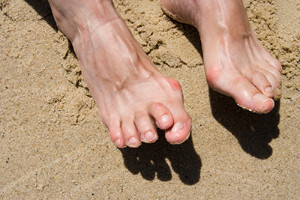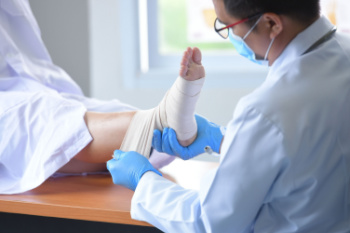
Hammertoe and mallet toe are common toe deformities, but they affect different joints. Hammertoe typically involves the second toe and bends at the middle joint, causing it to curl downward. Mallet toe, on the other hand, affects the joint closest to the toenail, making the tip of the toe point down. Both conditions often develop from pressure caused by wearing tight shoes, injury, or muscle imbalances. Early treatment may include switching to shoes with a roomy toe box, using protective padding, and performing toe-stretching exercises. In some cases, splints or orthotic inserts may help realign the toe. When these methods are not enough and pain or difficulty in walking persists, surgery may be necessary to correct the joint. If you notice your toe starting to bend unnaturally or becomes painful, it is suggested that you see a podiatrist for relief options.
Hammertoes can be a painful condition to live with. For more information, contact Dr. John C. Lawlor of Florida. Our doctor will answer any of your foot- and ankle-related questions.
Hammertoe
Hammertoe is a foot deformity that occurs due to an imbalance in the muscles, tendons, or ligaments that normally hold the toe straight. It can be caused by the type of shoes you wear, your foot structure, trauma, and certain disease processes.
Symptoms
- Painful and/or difficult toe movement
- Swelling
- Joint stiffness
- Calluses/Corns
- Physical deformity
Risk Factors
- Age – The risk of hammertoe increases with age
- Sex – Women are more likely to have hammertoe compared to men
- Toe Length – You are more likely to develop hammertoe if your second toe is longer than your big toe
- Certain Diseases – Arthritis and diabetes may make you more likely to develop hammertoe
Treatment
If you have hammertoe, you should change into a more comfortable shoe that provides enough room for your toes. Exercises such as picking up marbles may strengthen and stretch your toe muscles. Nevertheless, it is important to seek assistance from a podiatrist in order to determine the severity of your hammertoe and see which treatment option will work best for you.
If you have any questions, please feel free to contact one of our our offices located in Cape Coral and LaBelle, FL . We offer the newest diagnostic and treatment technologies for all your foot care needs.

The ankle is a complex joint made up of bones, ligaments, tendons, and cartilage, all working together to support movement and stability. When an injury occurs, one or more of these structures may be affected. A sprain typically involves stretching or tearing of the ligaments that connect bone to bone, often on the outer side of the ankle. Strains affect muscles or tendons, while fractures involve a break in one of the bones, such as the tibia, fibula, or talus. Swelling, bruising, and pain usually follow, as blood vessels and tissues respond to the trauma. In some cases, cartilage may also be damaged, contributing to long-term discomfort or stiffness. Understanding which structures are involved is key to guiding proper treatment and healing. If you have persistent ankle pain or limited motion after an injury, it is suggested you see a podiatrist for a diagnosis and appropriate treatment.
Ankle pain can have many different causes and the pain may potentially be serious. If you have ankle pain, consult with Dr. John C. Lawlor from Florida. Our doctor will assess your condition and provide you with quality foot and ankle treatment.
Ankle pain is any condition that causes pain in the ankle. Due to the fact that the ankle consists of tendons, muscles, bones, and ligaments, ankle pain can come from a number of different conditions.
Causes
The most common causes of ankle pain include:
- Types of arthritis (rheumatoid, osteoarthritis, and gout)
- Ankle sprains
- Broken ankles
- Achilles tendinitis
- Achilles tendon rupture
- Stress fractures
- Tarsal tunnel syndrome
- Plantar fasciitis
Symptoms
Symptoms of ankle injury vary based upon the condition. Pain may include general pain and discomfort, swelling, aching, redness, bruising, burning or stabbing sensations, and/or loss of sensation.
Diagnosis
Due to the wide variety of potential causes of ankle pain, podiatrists will utilize a number of different methods to properly diagnose ankle pain. This can include asking for personal and family medical histories and of any recent injuries. Further diagnosis may include sensation tests, a physical examination, and potentially x-rays or other imaging tests.
Treatment
Just as the range of causes varies widely, so do treatments. Some more common treatments are rest, ice packs, keeping pressure off the foot, orthotics and braces, medication for inflammation and pain, and surgery.
If you have any questions, please feel free to contact one of our our offices located in Cape Coral and LaBelle, FL . We offer the newest diagnostic and treatment technologies for all your foot care needs.

Children and adolescents involved in sports are at risk for overuse foot injuries, which develop gradually from repetitive stress rather than from a single traumatic event. Common examples include Sever’s disease, a painful inflammation of the heel growth plate, and stress fractures that often affect the metatarsals. Tendonitis and plantar fasciitis can also occur in young athletes, especially those involved in high-impact activities like running, soccer, or basketball. These injuries may start as mild soreness but can worsen without rest or proper treatment. Growth plates in developing feet are more vulnerable to strain, making early recognition important. Wearing appropriate footwear, avoiding overtraining, and allowing time for recovery are key prevention strategies. Because lingering foot pain in children is not a normal part of growth, and untreated injuries can lead to long-term problems, it is suggested that you see a podiatrist for evaluation and guidance.
Ankle and foot injuries are common among athletes and in many sports. They can be caused by several problems and may be potentially serious. If you are feeling pain or think you were injured in a sporting event or when exercising, consult with Dr. John C. Lawlor from Florida. Our doctor will assess your condition and provide you with quality foot and ankle treatment.
Common Injuries
The most common injuries that occur in sporting activities include:
- Achilles Tendonitis
- Achilles Tendon Rupture
- Ankle Sprains
- Broken Foot
- Plantar Fasciitis
- Stress Fractures
- Turf Toe
Symptoms
Symptoms vary depending upon the injury and in some cases, there may be no symptoms at all. However, in most cases, some form of symptom is experienced. Pain, aching, burning, bruising, tenderness, tightness or stiffness, sensation loss, difficulty moving, and swelling are the most common symptoms.
Treatment
Just as symptoms vary depending upon the injury, so do treatment options. A common treatment method is known as the RICE method. This method involves rest, applying ice, compression and elevating the afflicted foot or ankle. If the injury appears to be more serious, surgery might be required, such as arthroscopic or reconstructive surgery. Lastly, rehabilitation or therapy might be needed to gain full functionality in the afflicted area. Any discomfort experienced by an athlete must be evaluated by a licensed, reputable medical professional.
If you have any questions, please feel free to contact one of our our offices located in Cape Coral and LaBelle, FL . We offer the newest diagnostic and treatment technologies for all your foot care needs.









